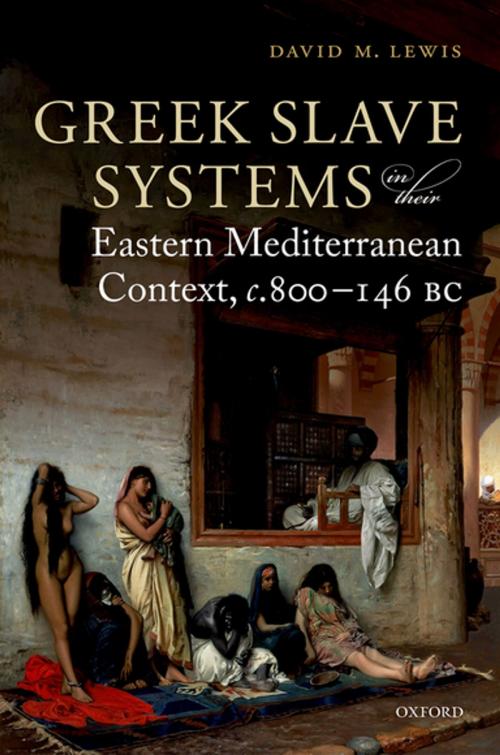Greek Slave Systems in their Eastern Mediterranean Context, c.800-146 BC
Nonfiction, History, Ancient History, Business & Finance| Author: | David M. Lewis | ISBN: | 9780191082627 |
| Publisher: | OUP Oxford | Publication: | July 19, 2018 |
| Imprint: | OUP Oxford | Language: | English |
| Author: | David M. Lewis |
| ISBN: | 9780191082627 |
| Publisher: | OUP Oxford |
| Publication: | July 19, 2018 |
| Imprint: | OUP Oxford |
| Language: | English |
The orthodox view of ancient Mediterranean slavery holds that Greece and Rome were the only 'genuine slave societies' of the ancient world, that is, societies in which slave labour contributed significantly to the economy and underpinned the wealth of elites. Other societies, labelled 'societies with slaves', have been thought to have made little use of slave labour and therefore have been largely ignored in recent scholarship. This volume presents a radically different view of the ancient world of the Eastern Mediterranean, portraying it as a patchwork of regional slave systems. Although slavery was indeed particularly highly developed in Greece and Rome, it was also entrenched in Carthage and other parts of the Eastern Mediterranean, and played a not insignificant role in the affairs of elites in Assyria, Babylonia, and Persia. In Greece, diversity was the rule: from the early archaic period onwards, differing historical trajectories in various regions shaped the institution of slavery in manifold ways, producing very different slave systems in regions such as Sparta, Crete, and Attica. However, in the wider Eastern Mediterranean world, we find a similar level of diversity: slavery was exploited to differing degrees across all of these regions, and was the outcome of a complex interplay between cultural, economic, political, geographic, and demographic variables. In seeking to contextualize slaving practices across the Greek world through detailed soundings of the slaving practices of the Israelites, Assyrians, Babylonians, Persians, and Carthaginians, this volume not only provides new insights into these ancient cultures, but also allows for a nuanced exploration of the economic underpinnings of Greek elite culture that sets its reliance on slavery within a broader context and sheds light on the complex circumstances from which it emerged.
The orthodox view of ancient Mediterranean slavery holds that Greece and Rome were the only 'genuine slave societies' of the ancient world, that is, societies in which slave labour contributed significantly to the economy and underpinned the wealth of elites. Other societies, labelled 'societies with slaves', have been thought to have made little use of slave labour and therefore have been largely ignored in recent scholarship. This volume presents a radically different view of the ancient world of the Eastern Mediterranean, portraying it as a patchwork of regional slave systems. Although slavery was indeed particularly highly developed in Greece and Rome, it was also entrenched in Carthage and other parts of the Eastern Mediterranean, and played a not insignificant role in the affairs of elites in Assyria, Babylonia, and Persia. In Greece, diversity was the rule: from the early archaic period onwards, differing historical trajectories in various regions shaped the institution of slavery in manifold ways, producing very different slave systems in regions such as Sparta, Crete, and Attica. However, in the wider Eastern Mediterranean world, we find a similar level of diversity: slavery was exploited to differing degrees across all of these regions, and was the outcome of a complex interplay between cultural, economic, political, geographic, and demographic variables. In seeking to contextualize slaving practices across the Greek world through detailed soundings of the slaving practices of the Israelites, Assyrians, Babylonians, Persians, and Carthaginians, this volume not only provides new insights into these ancient cultures, but also allows for a nuanced exploration of the economic underpinnings of Greek elite culture that sets its reliance on slavery within a broader context and sheds light on the complex circumstances from which it emerged.















